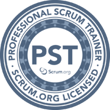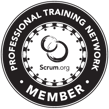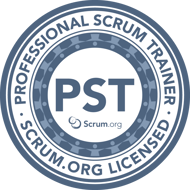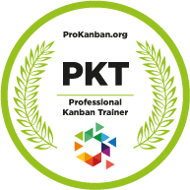Learning Objectives
Following the PSMPO course, you'll have learned how to perform the following:
Topics
The PSMPO course is a mix of lecture, case studies and interactive exercises as you collaborate with other students:
- Scrum Theory, Principles & Empiricism
- How variables can lead to complexity.
- Relating complexity and management styles.
- Predictive and empirical approaches to problems.
- Exploring the advantages of agility.
- Defined and empirical processes.
- Requirements of empiricism.
- Scrum and the three legs of empiricism.
- Complexity of product development.
- The Scrum Framework
- What's needed for Scrum?
- Exploring accountability.
- Scrum roles, events and artifacts.
- Examining the value of time-boxing.
- Scrum values and empiricism.
- How Scrum roles, artifacts & events relate to the Product Owner.
- The purpose of a Product Owner.
- Key points for a Product Owner.
- The Product Owner & Development Team relationship.
- Definition of Done and the Product Owner.
- Scaling the Product Owner role.
- People and Teams
- Great teams.
- Intrinsic motivation.
- Cross-functionality.
- Scrum values.
- Stages of group development.
- The Scrum Master
- Experiencing positive leadership.
- Choices of servant leaders.
- How will you help others improve?
- Responsibilities of a Scrum Master.
- Scrum Master skills and traits.
- Done and Undone
- Can quality become a habit?
- Technical debt and addressing its effect.
- Understanding the importance of Done.
- Defining "potentially releasable".
- Impacts of not defining Done.
- Product Backlog Management & Product Delivery with Scrum
- Why plan product development with Scrum?
- Key characteristics of Product Backlogs.
- Methods of Product Backlog organization.
- Techniques for Product Backlog ordering and valuation.
- Techniques for estimating size of Product Backlog Items.
- Product Backlogs & roadmaps.
- Managing vision, value and validation.
- Visualizing and planning upcoming work.
- Planning and forecasting.
- Monitoring and reporting progress.
- Agile Product Management
- Why is agility important to your organization?
- Product and project mindsets.
- Techniques for modeling business strategy and creating a product vision.
- Value-Driven Development
- Defining, Delivering & Measuring Value.
- Optimizing Business Value Over Time.
- Value Metrics.
- Measurement Strategies.
- Release Planning
- Release Strategies.
- Techniques for Estimating Effort.
- Measuring Progress.
- Refining Product Backlog.
Scrum.org Certification
After completing a Combo Professional Scrum Master & Product Owner class, you'll receive credentials to attempt the Professional Scrum Master I (PSM I) assessment and earn the industry-recognized PSM I Certification. These credentials never expire, however should you attempt the PSM I assessment within 14 days after receiving your credentials and not receive a passing score, you'll be granted a 2nd attempt for no additional fee.
Earning your PSM I Certification will make you part of an elite community of 300,000+ PSM I badge holders from around the globe and unlike other Scrum training and certification organizations, your certification will never expire nor require future renewal fees.
You'll also receive credentials to attempt the Professional Scrum Product Owner I (PSPO I) assessment and earn the industry-recognized PSPO I Certification. These credentials never expire, however should you attempt the PSPO I assessment within 14 days after receiving your credentials and not receive a passing score, you'll be granted a 2nd attempt for no additional fee.
Earning your PSPO I Certification will make you part of an elite community of 75,000+ PSPO I badge holders from around the globe and unlike other Scrum training and certification organizations, your certification will never expire nor require future renewal fees.
Public and Private Training
Please visit our public training schedule to find our upcoming public PSM classes.
Interested in private on-site or Live Virtual Training? If so, private classes are available with group discounts! Please contact us at training@madisonhenry.com or 844.BE.AGILE so we can discuss your needs.
PMI PDU Credits
Students of Scrum.org courses are able to claim Project Management Institute (PMI) PDU credit: 14 - 21 PDUs. Please note that PMI PDUs are earned for course attendance and not for earning a Scrum.org certification. Students can claim PDUs under PMI’s "Education courses provided by other third party providers” category. You can claim your PDUs here.
About Scrum.org
Scrum.org is the home of Scrum, leading the evolution and maturity of Scrum to improve the profession of software development.
In addition to defining industry-leading Scrum training for practitioners at all levels, Scrum.org provides all of the tools and resources needed by Scrum practitioners to deliver value using Scrum. It hosts the Scrum Guide in 30 languages, provides assessments to allow people to evaluate themselves and improve and hosts community blogs, forums and resources to foster discussion and knowledge transfer.
Why Train with Scrum.org?
-
Scrum Leadership – Scrum.org is led by the co-creator of Scrum, Ken Schwaber.
-
Scrum Guide Alignment – Scrum.org's training is aligned with the Scrum Guide that is published and maintained by Scrum co-creators Ken Schwaber and Jeff Sutherland.
-
Consistent Quality – Scrum.org has developed and regularly enhances 1 body of content for each of its courses in collaboration with Scrum.org's 300+ global Professional Scrum Trainer to help ensure consistency and high quality. Scrum.org's approach of integrating lectures with team-based case studies and interactive exercises helps enable a great learning experience and preparation to begin effectively applying Scrum.
-
Meaningful Certifications – Scrum.org's Assessment & Certification Program includes rigorous assessments with the opportunity to examine your knowledge of Scrum, earn highly respected certifications and be recognized on Scrum.org. And unlike other Scrum training and certification organizations, your certification will never expire nor require future renewal fees.examine your knowledge of Scrum, earn highly respected certifications and be recognized on Scrum.org.
About Madison Henry 

The Madison Henry Group helps clients realize the benefits of agile software development and pursue organizational agility.
Founded in 2005, Madison Henry enables high performance and optimizes the value delivered by complex software through three lines of professional services: Agile Transformation with coaching and consulting across the enterprise; Training & Certification in partnership with industry leaders such as Scrum.org, Kanban University and Scaled Agile (SAFe); and Staff Augmentation for the key roles of Scrum Masters, Scrum Developers and Kanban Delivery Managers.
We are passionate about our work. We value insight, commitment and innovation. We maintain an unwavering pledge to client success and satisfaction.








